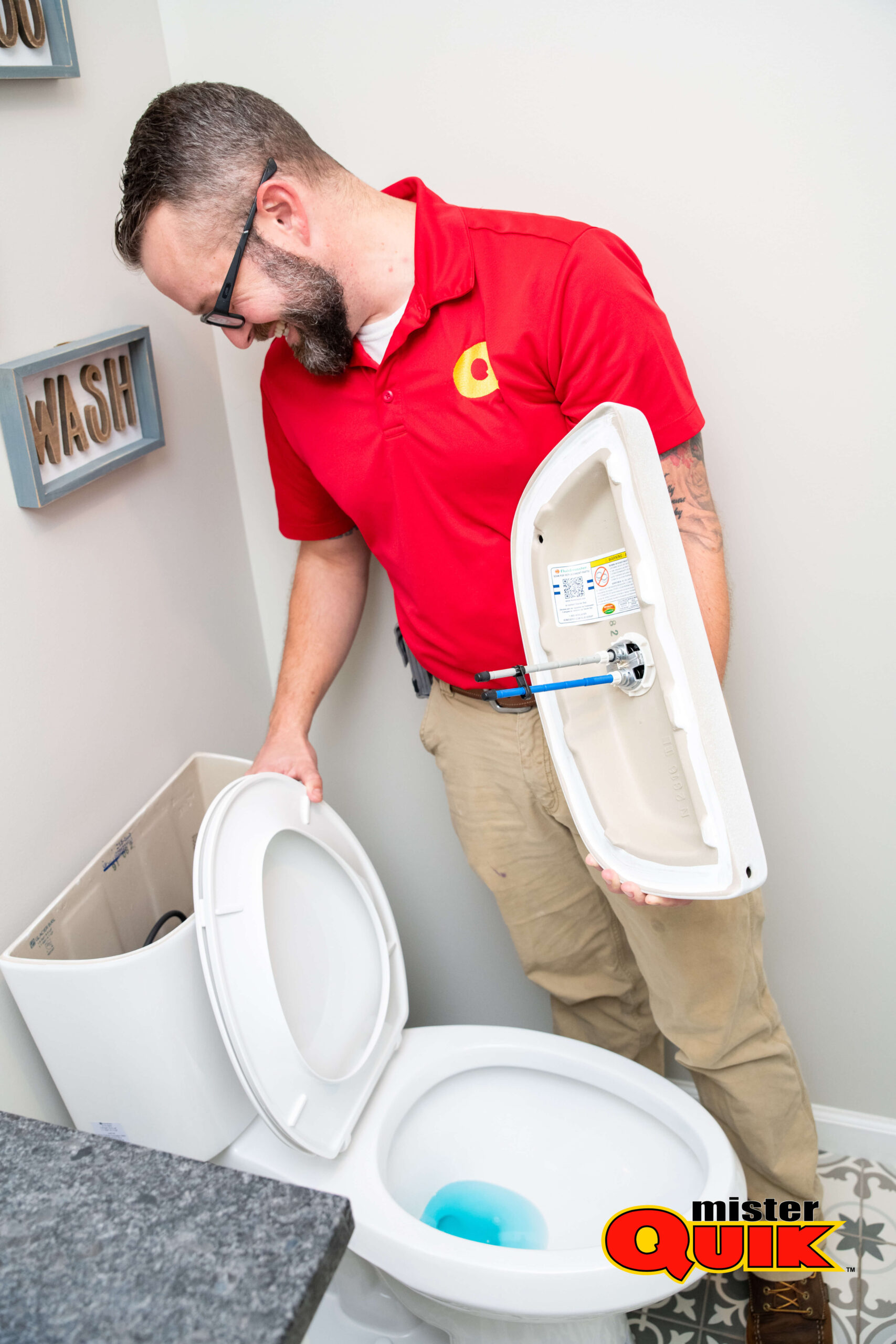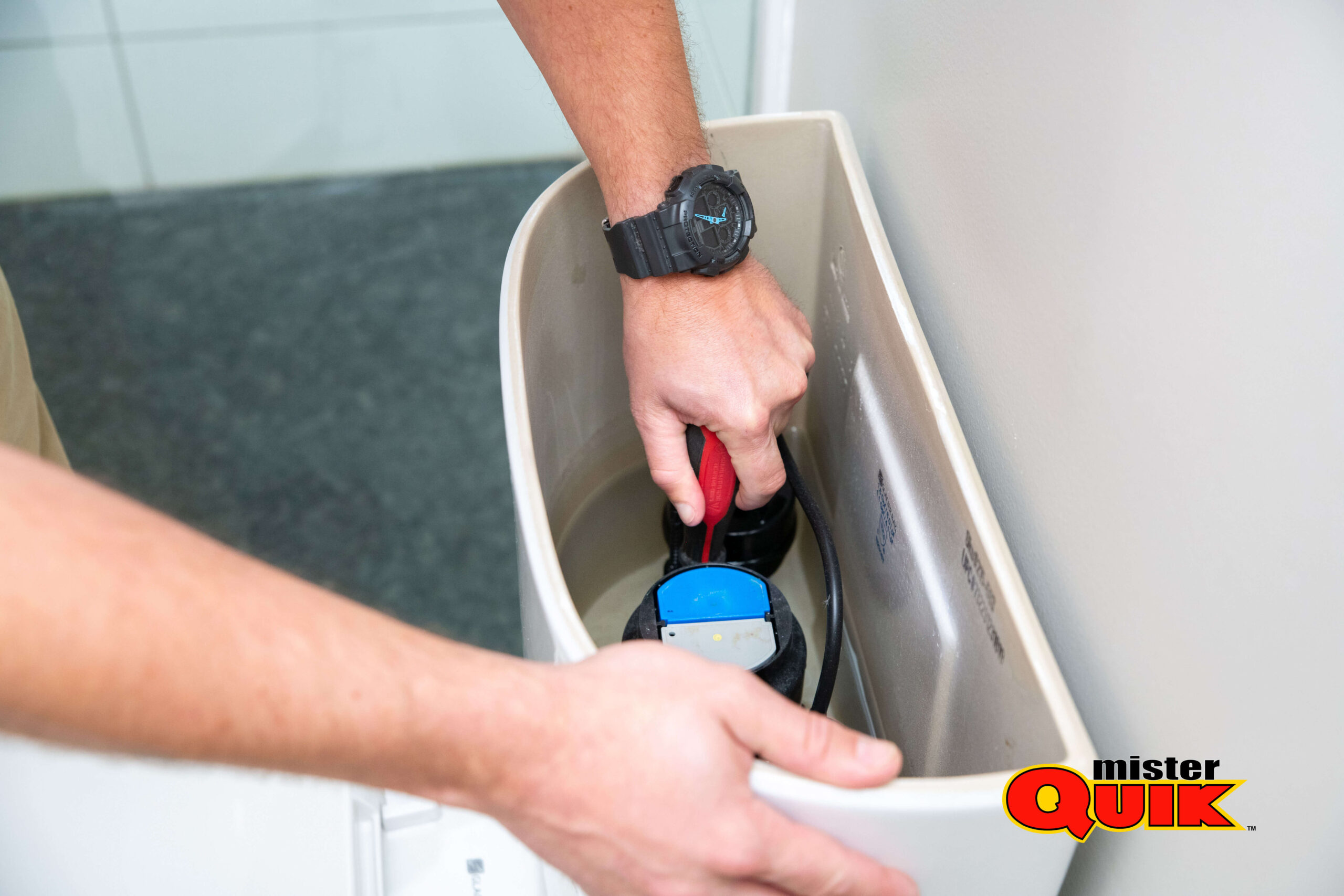Toilet overflow repair in Zionsville

Toilet overflow repair near me
When a toilet overflows, it’s not just an inconvenience; it’s a plumbing emergency that demands swift, effective action. At Mister Quik Home Services in Zionsville, we understand the urgency and offer expert solutions to resolve toilet overflow issues promptly. Here’s why you can trust us for your toilet overflow repair needs:
- Rapid Response: We prioritize your comfort and safety, which is why our team responds promptly to your call for toilet overflow repair. No matter the time of day or night, we’re here to assist you when you need it most.
- Experienced Technicians: Our team consists of highly skilled and experienced technicians who specialize in handling all types of plumbing emergencies, including toilet overflows. With their expertise, they can quickly identify the root cause of the issue and implement the necessary repairs with precision.
- Advanced Equipment: Equipped with state-of-the-art tools and equipment, our technicians are capable of tackling even the most challenging toilet overflow repair tasks efficiently. From drain snakes to hydro-jetting machines, we use advanced technologies to clear clogs and restore proper function to your toilet.
- Comprehensive Inspections: We don’t just address the immediate problem; we also conduct thorough inspections to identify any underlying issues that may have contributed to the toilet overflow. By addressing these issues proactively, we help prevent future plumbing emergencies and ensure long-term peace of mind for our customers.
- Customized Solutions: Every toilet overflow repair situation is unique, which is why we tailor our solutions to meet the specific needs of each customer. Whether it’s a simple clog or a more complex plumbing issue, we develop customized repair plans that effectively resolve the problem and restore your toilet to optimal performance.
- Transparent Pricing: At Mister Quik Home Services, we believe in transparency and honesty in all our dealings. Before starting any repair work, we provide upfront pricing estimates, so you know exactly what to expect. We believe in fair and competitive pricing, with no hidden fees or surprises.
- Customer Satisfaction Guaranteed: Your satisfaction is our top priority, and we go above and beyond to ensure that every customer is happy with the results of our toilet overflow repair services. From our friendly customer service to our quality workmanship, we strive to exceed your expectations at every step of the process.
- Emergency Services Available: Toilet overflows can happen at any time, which is why we offer 24/7 emergency services for your convenience. Whether it’s the middle of the night or a holiday weekend, you can count on us to be there when you need us.
Don’t let a toilet overflow ruin your day. Contact Mister Quik Home Services in Zionsville for fast, reliable toilet overflow repair solutions that you can trust. With our expertise and dedication to customer satisfaction, we’ll have your toilet back in working order in no time.
Moen, Delta Faucets, Kohler, American Standard, Toto, Mansfield Plumbing, Price Pfister Peerless, Lochinvar, Rinnai, Navien, Grohe, Speakman, Gerber, Whirlpool, Easywater, AO Smith, Rheem, Bradford White, Culligan, Kinetico, Sterling, Brizo, Gastite, Zoeller, Glentronics, Zurn, Grundfos Pumps, Blanco, Bocchi, Bradley Company, Brasscraft Manufacturing Company, Kerox, Ltd, Dornbracht Americas Inc, Falcon Water Technologies LLC, Fisher Manufacturing, Company, Fluidmaster, Inc, Hansgrohe Inc, Haws Corporation, LAUFEN Schweiz AG, Lavelle Industries, Inc, LIXIL, LSP Products Group LLC, Marcone Plumbing, Masco Corporation, Neoperl, Inc, Reliance Worldwide Corporation, Sloan Valve Company, Sprite Industries, T&S Brass and Bronze, Works Inc, Uponor, Viega LLC, Water Pik Inc, WCM Industries Inc, Axor, Decolav, Dreamline Showers, DXV, Fairmont Design, Fortis, Franke, Geberit Plumbing, Ginger, Graff, HydroSystems, Infinity Drains, In-Sink-Erator, Jacuzzi, James Martin, LinkaSink, MTI, Native Trails, Newport Brass, PROFLO, Rohl, Signature Hardware, Strasser, Swanstone, Thompson Traders, Watermark, Zucchetti, Alfi, ANZZI, Altair, AquaPure, Avanity, Avano, Azzuri, Bella CORE, Bemis, Brondell, CRAFT + MAIN, California Faucets, Chicago Faucets, Clarke, Cutler Kitchen and Bath, Duravit, EAGO, Eccotemp, Eemax, Fresca, Giagni, Houzer, Jones Stephens, Kaldewei, Kingston Brass, Kraus, Liberty Pumps, Little Giant, MediTub, Nameeks, OVE Decors, Pulse, Purewater Baths, Sagehill Designs, Saniflo, Stiebel Eltron, Swiss Madison, Symmons, Ultra Faucets, VIGO, WS Bath Collections, Waste King, Watts, Whitehaus
Why is my toilet overflowing
Experiencing a toilet overflow can be a frustrating and messy ordeal. Understanding the reasons behind this plumbing issue is crucial for preventing future occurrences. At Mister Quik Home Services in Zionsville, we’re here to shed light on the common causes of toilet overflows:
One of the most frequent culprits behind a toilet overflow is a clogged drain. This blockage can occur due to various reasons, including the buildup of toilet paper, hair, soap scum, or foreign objects flushed down the toilet. As the obstruction restricts water flow, it can lead to a backup and subsequent overflow.
The flapper valve is a crucial component of the toilet's flushing mechanism. If it becomes damaged, worn out, or misaligned, it may not seal properly after flushing, allowing water to continuously leak into the bowl. This continuous flow of water can result in an overflow if not addressed promptly.
The fill valve regulates the water level in the toilet tank after each flush. If the fill valve is malfunctioning or damaged, it may fail to shut off properly, causing water to continuously enter the tank. Eventually, the rising water level can spill over into the bowl and cause an overflow.
A blockage or obstruction in the sewer line connected to your toilet can also lead to overflow issues. Tree roots, debris, or sediment buildup can restrict the flow of wastewater, causing it to back up into your home and overflow from the toilet bowl.
Yes, a bad flapper can cause a toilet to overflow. The flapper is a rubber valve that seals the toilet tank and controls the flow of water into the bowl during flushing. If the flapper is worn, damaged, or not sealing properly, water may continuously leak from the tank into the bowl, leading to an overflow situation.
To stop a toilet from filling up and potentially overflowing, you can try a few troubleshooting steps. First, lift the tank lid and manually push down on the flapper to stop water from flowing into the bowl. If the flapper isn’t the issue, check the float ball or float cup to ensure it’s not stuck or obstructed. You can also adjust the float mechanism to lower the water level in the tank, which may prevent overflow. If these methods don’t work, shutting off the water supply valve behind the toilet can quickly stop the flow of water and prevent further filling and potential overflow.
How to fix overflowing toilet bowl
Dealing with an overflowing toilet bowl can be a messy and stressful situation. However, with the right knowledge and tools, you can often resolve the issue on your own. Here are some steps to follow if you encounter an overflowing toilet bowl:


The first step is to stop the flow of water to the toilet. Locate the shut-off valve, which is typically located behind the toilet near the floor. Turn the valve clockwise to shut off the water supply to the toilet.
Before attempting to fix the problem, it’s essential to determine the cause of the overflow. Common reasons include a clog in the toilet trap or drain pipe, a malfunctioning float valve, or a problem with the toilet’s flushing mechanism.
If the toilet bowl is not draining properly, use a plunger to try to dislodge the clog. Place the plunger over the drain hole in the toilet bowl and apply firm, even pressure. Be sure to maintain a tight seal between the plunger and the drain to maximize suction.
If plunging does not resolve the issue, you may need to use a plumbing snake to clear the clog. Insert the snake into the toilet drain and rotate it clockwise while pushing it further into the pipe. Continue feeding the snake into the drain until you encounter resistance, then rotate it to break up the clog.
If the toilet bowl continues to overflow after clearing any clogs, the problem may be with the float valve in the toilet tank. Lift the lid off the toilet tank and inspect the float valve mechanism. Ensure that the float is moving freely and adjust it if necessary to regulate the water level in the tank.
The flapper is responsible for sealing the opening at the bottom of the tank, allowing water to flow into the bowl during flushing. If the flapper is not sealing properly, water may continuously leak into the bowl, causing it to overflow. Inspect the flapper for signs of damage or wear and replace it if necessary.
How to fix overflowing toilet DIY solutions
Encountering an overflowing toilet can be a stressful situation, but with the right DIY solutions, you may be able to resolve the issue on your own. Here are some steps and tips for fixing an overflowing toilet:


The first step is to prevent further water from entering the toilet bowl. Locate the shut-off valve, usually located behind the toilet near the floor. Turn the valve clockwise to shut off the water supply to the toilet.


Before attempting any DIY fixes, it's essential to identify the cause of the overflow. Common reasons include a clog in the toilet trap or drain pipe, a malfunctioning float valve, or a problem with the toilet's flushing mechanism.




A plunger is often the most effective tool for clearing a clog in the toilet drain. Ensure there is enough water in the bowl to cover the plunger, then place the plunger over the drain hole and apply firm, downward pressure. Repeat this motion several times to dislodge the clog.




If plunging doesn't resolve the issue, you may need to use a plumbing snake (also known as a toilet auger) to break up the clog. Insert the snake into the toilet drain and rotate it clockwise while pushing it further into the pipe. Continue feeding the snake into the drain until you encounter resistance, then rotate it to break up the clog.




A malfunctioning float valve can cause the toilet tank to overfill, leading to an overflow. Lift the lid off the toilet tank and inspect the float valve mechanism. Ensure that the float moves freely and adjust it if necessary to regulate the water level in the tank.
Mold after toilet overflow
Experiencing a toilet overflow in your home can lead to more than just water damage; it can also create a breeding ground for mold growth if not properly addressed. At Mister Quik Home Services in Zionsville, we understand the importance of addressing mold after a toilet overflow promptly and effectively. Here’s what you need to know about dealing with mold in this situation:
Understanding Mold Growth:
Mold thrives in damp and humid environments, making a toilet overflow an ideal breeding ground. When water from the overflow seeps into walls, floors, and other porous surfaces, it creates the perfect conditions for mold spores to take hold and proliferate.
Health Risks:
Mold exposure can pose significant health risks, particularly for individuals with allergies, asthma, or weakened immune systems. Common symptoms of mold exposure include coughing, wheezing, nasal congestion, skin irritation, and eye irritation. Prolonged exposure to mold can exacerbate these symptoms and lead to more serious health issues.
Immediate Action:
If you discover mold growth after a toilet overflow, it’s crucial to take immediate action to address the problem. Mold can spread rapidly, so prompt remediation is essential to prevent further damage and protect your health.
Safety Precautions:
Before attempting to clean up mold yourself, it’s essential to take proper safety precautions. Wear protective gear such as gloves, goggles, and a mask to prevent exposure to mold spores. Open windows and doors to ventilate the area and use fans to help dry out the affected surfaces.
Cleaning and Disinfection:
To remove mold from surfaces, use a solution of water and detergent or a commercial mold cleaner. Scrub the affected areas thoroughly with a brush or sponge, then rinse with clean water and allow the surfaces to dry completely. After cleaning, disinfect the area with a disinfectant to kill any remaining mold spores.
How to clean up toilet overflow
Dealing with a toilet overflow is not only messy but can also pose health risks due to the potential growth of mold and bacteria. Proper cleanup is essential to ensure your home remains safe and sanitary. Here are some expert tips on how to clean up toilet overflow effectively:
Before you begin the cleanup process, ensure your safety by wearing protective gear such as rubber gloves, goggles, and a mask to prevent exposure to harmful bacteria and contaminants.
If the toilet is still overflowing, locate the shut-off valve behind the toilet and turn it clockwise to stop the flow of water. This will prevent further damage and flooding.
Use towels, mops, or a wet/dry vacuum to remove any standing water from the floor around the toilet. Be sure to dispose of the contaminated water properly to prevent further spread of bacteria.
Thoroughly disinfect all affected surfaces. Pay close attention to the area around the toilet, including the floor, baseboards, and walls. Allow the disinfectant to sit for a few minutes before wiping it clean with a damp cloth.
Wash all items that came into contact with the contaminated water, such as towels, bath mats, and clothing, using hot water and laundry detergent. For non-porous surfaces like tile or vinyl flooring, use a mild detergent to clean and sanitize the area.
Rest assured knowing that reliable assistance is just a phone call away. With Mister Quik Home Services in Indianapolis, you can trust our experienced professionals to quickly resolve your no running water issues with efficiency and expertise. Contact us today to experience top-quality plumbing services and restore water flow to your home!
Troubleshoot Checklist:
- Locate the shut-off valve behind the toilet and turn it clockwise to stop the water supply.
- If necessary, lift the tank lid and manually push down on the flapper to prevent water from flowing into the bowl.
- Check for a clog in the toilet trap or drain pipe, which could be causing the backup.
- Inspect the float valve and flapper valve for any damage or misalignment that may be contributing to the overflow.
- Plunge the toilet to dislodge any clogs, ensuring a tight seal between the plunger and the drain.
- Use a plumbing snake to break up stubborn clogs if plunging doesn’t resolve the issue.
- Inspect the float valve to ensure it moves freely and adjust it if necessary to regulate the water level in the tank.
- Examine the flapper valve for signs of wear or damage, replacing it if needed to prevent continuous water leakage.
- If DIY efforts are unsuccessful or if you’re uncomfortable with the repairs, contact a professional plumber.
- Consider professional assistance if the overflow is severe, or if there are signs of extensive water damage or mold growth.









